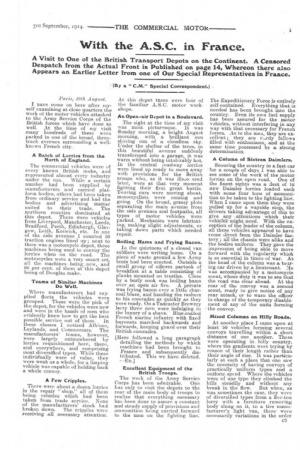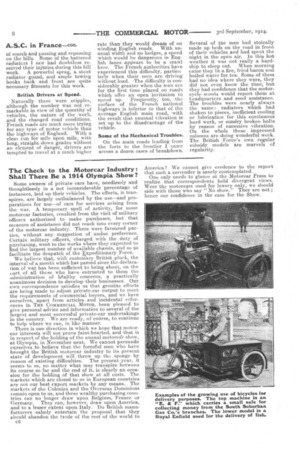With the A.S.C. in France.
Page 5

Page 8

If you've noticed an error in this article please click here to report it so we can fix it.
. (By a "C.M." Special Correspondent.)
Paris, 29th August.
I have come on here after myself examining at close quarters the work of the motor vehicles attached to the Army Service Corps of the British forces which have done so well. At the time of my visit many hundreds of these were parked in one of the broad, threetrack avenues surrounding a wellknown French city.
A Batch of Lorries from the North of England.
The commercial vehicles were of every known British make, and represented almost every industry under the sun. While a certain number had been supplied by manufacturers and carried platform bodies, others had been taken from ordinary service and had the bodies and advertising matter suited to their trade. The northern counties dominated at this depot. There were vehicles from Liverpool, Manchester, Leeds, Bradford, Perth, Edinburgh, Glasgow, Leith, Keswick, etc. In one of the side avenues. I counted 20 traction engines lined up ; next to them was a motorcycle depot, these machines being used to convoy the lorries when on the road. The rnoto:icycles were a very smart set, all the machines Jaeing new,.. and 90 per cent, of them at this depot being of Douglas make.
Teams of Similar Machines Do Well.
Where manufacturers had supplied fleets the vehicles were grouped. These were the pick of the depot, for the vehicles were new and were in the hands of men who evidently knew how to get the best possible service out of them. In these classes I noticed Alhions, Leylands, and Commercars. The manufacturers' teams, however, were largely outnumbered by lorries requisitioned here, there, and everywhere, and comprising most diversified types. While these individually were of value, they were weak as a whole, for a limping vehicle was capable of holding back a whole convoy.
A Few Cripples.
There were about a dozen lorries in the repair "shop," all of them being vehicles which had been taken from trade service. None of the manufacturers' stock had broken down. The cripples were receiving all necessary attention. At this depot there were four of the familiar A.S.C. motor workshops.
An Open-air Depot in a Boulevard.
The sight at the time of my visit was most picturesque. It was Sunday morning, a bright August morning, with a brilliant sun shming out of a cloudless sky. Under the shelter of the trees, in this beautiful avenue suddenly transformed into a garage, it was warm without being intolerably hot. In the central roadway lorries were lined up ready to move away with provisions for the Brilish troops who, as it was discoered later, were at that very moment fighting their first great battle. Touring cars were moving about, motorcyclists were coming and going. On the broad, grassy plots separating the main avenue from the side avenues and footpaths, all types of motor vehicles were parked. Mechanics were lubricating, making slight adjustments, or taking down parts which needed repair.
Bailing Hams and Prying Bacon.
In the quietness of a closed van soldiers were writing home. On a piece of waste ground a few Army tents had been erected. Outside a small group of officers partook of breakfast at a table consisting of planks mounted on trestles. Close by a burly cook was boiling hams over an open air fire. A private was frying bacon over a little charcoal blaze, and handing the rashers to his comrades as quickly as they were ready. On a Tad-caster Brewery lorry three men were indulging in the luxury of a shave. Blue-coated French marine infantry with fixed bayonets marched backwards and forwards, keeping guard over their British comrades.
[Here followed a long paragraph detailing the methods by which machines had been brought to France and subsequently distributed. This we have deleted. —En.] Excellent Equipment of the British Troops.
The work of the Army Service Corps has been admirable. One has only to visit the depots to the rear of the main body of troops to realize that everything necessary has been done to assure a constant and steady supply of provisions and ammunition being carried forward to the men on the fighting line. The Expeditionary Force is entirely self-contained. Everything that is needed has been brought into the country. Even its own fuel supply has been assured for the motor vehicles, without interfering in any. way with that necessary for French forces. As to the men, they are excellent ;. they are Partly fellows filled with enthusiasm, and at the same time possessed by a strong determination.
A Column of Sixteen Daimlers.
Scouring the country in a fast car for a couple of days I was able to see some of the work of the motor lorries on. the open road. One of the finest sights was a deet of 16 new Daimler lorries loaded each with some four tons of ammunition to be taken to the fighting line. When I came upon them they were pulled up for a wayside stop, the drivers taking advantage of this to give any . attentions which their vehicla might need. With the exception of the leader of the column, all these vehicles appeared to have come direct from the Daimler factory; all the chassis were alike and the bodies uniform. They gave the impression of being able to move forward with the regularity which is so essential in times of war. At the head of the column was a touring car driven by a lieutenant. Ie In as accompanied by a motorcycle scout, whose duty it was to see that the road was clear ahead. At the rear of the convoy was a second scout, ready to give notice of any rear attack, or to warn the officer in charge of the temporary disablement of any of the units forming the convoy.
Mixed Columns on Hilly Roads.
At another place I came upon at least 50 vehicles forming several convoys travelling within a short distance of one another. These were operating in hilly country, where the gradients. were trying by reason of their length rather than their angle of rise. It was particularly at such a place that one saw the necessity of having convoys of practically uniform types and a uniform speed Where the vehicles were of one type they climbed the hills steadily and without any break in the flow. But when, as was sometimes the case, they were of diversified types from a five-ton lorry with a furniture removing body slung on it, to a tire mann. facturer's light van, there were necessarily variations in the order
of march and passing and repassing on the hills. Some of the battered radiators I saw had doubtless received their injuries during this hill work. A powerful sprag, a stout radiator ,guaad, and ample towing hooks back and front are quite necessary fitments for this work.
British Drivers at Speed.
Naturally there were cripples, although the number was not remarkable in view of the quantity of vehicles, the nature of the work, and the changed road conditions. French roads are much more trying for any type of motor vehicle than the highways of England. With a cleai run for mile upon mile, with long, straight down grades without an element of danger, drivers are tempted to travel at a much higher
rate than they would dream of on winding English roads. With unusual width and no hedges, a speed which would be dangerous in English lanes appears to be a crawl here. The French authorities have experienced this difficulty, particu larly when their men are driving without load. The difficulty is considerably greater when the men are for the first time placed on roads which offer an open invitation to spend up. Frequently,too, the surface of the French national highways is inferior to that of the average English main road, with the result that unusual vibration is set up to the disadvantage of the vehicle.
Some of the Mechanical Troubles.
On the main roads leading from the forts to the frontier I came across a dozen cases of breakdown. Several of tne men had stoically made up beds on the road in front of their vehicles and had spent the night in the open air. in this hot weather it was not really a hardship to sleep out. When morning came they lit a fire, fried bacon and boiled water for tea. Some of them had no idea where they were, they did not even know the time, but they had confidence that the motorcycle scouts would report them at F eadquarters and send assistance. The troubles were nearly always the same : radiators which had shaken to pieces, inefficient cooling or lubrication for this continuous hard work, or sundry broken bolts by reason of excessive vibration. On the whole these impressed columns are doing wonderful work. The British Force's own regular subsidy models are marvels of regularity.


















